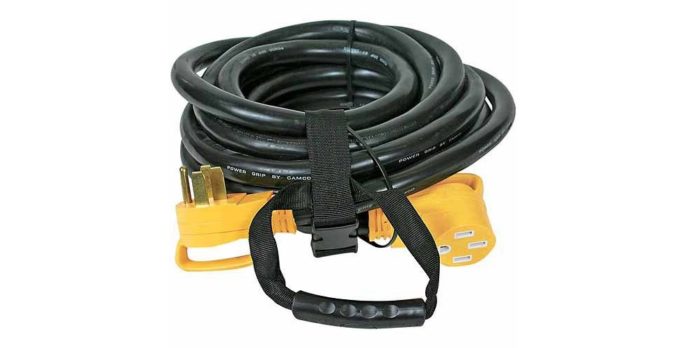A 50 amp RV extension cord is no joke as it means a high power carrying capacity. What makes RV extension cords so important, and how do they function? In this article, we shall provide answers to both these questions.
How your RV circuits work
Your RV can be a motorhome or a trailer. Both of these have different electrical systems.
Your motorhome operates on either a 12-volt system or a 120-volt system. Trailers run on either shore power or house batteries. As we all know, not every appliance has the same amperage rating. Due to this difference, not every gadget can operate on the same power source.
Things like your Air conditioner, microwave, and Television (not a 12-volt TV) cannot run on batteries. As a result, they need a 120-volt power source. 12-volt batteries can power USB ports and interior lights of your RV.
The 12-volt power system is the power you get from batteries. No matter the appliances you have in your RV, connecting to a shore power source provides 120-volt power. With a functioning converter, your batteries should get charged.
Extension cords are a great way to extend circuits away from the outlets available to where you need them. The position of your shore house power outlet or battery outlet is not always at the exact spot where you need it. For this reason, you need an extension cord.
In extension cords, a low American Wire Gauge (AWG) equals a high thickness of the wire used and an equivalent high capacity rate and vice versa. In getting an RV Extension Cord, you need to look out for one with a low AWG number. You also need to consider the length, AWG number, and the amperage rate. The appliances you would like to power in your RV should not be of a lower amperage rating than your extension cord.
Tips to the safe use of RV Extension Cords
– Electrical accidents are somewhat unavoidable. However, here are some tips to reduce how prone you are to these accidents.
– Get various lengths of extension cords. A short RV extension cord is always of more advantage.
– For good connection, properly clean the prongs of the extension cord with light grit sandpaper.
– Ensure that all prongs are tightly secure.
– If the cut on your extension cord runs deep, you can no longer use it. If, however, the mark is superficial, you could fix it up with electrical tape.
– Make sure all connections are secure. In disconnecting the extension cord, do not pull on the extension cord. You must remove the head of the extension cord from the power outlet using the handle instead.
– Ensure the safety of the connections. Your RV extension cord and its corresponding outlet should not be left lying around and exposed to moisture.
– Limit the number of cord adaptors you use, and when the adaptor gets hot, you should disassemble the setup to avoid melting and short-circuiting.
– Do not use an indoor extension cord for outdoor purposes because indoor extension cords do not have weather-resistant features.
– Extension cords are for temporary use only, and you should use them only when necessary.
– Never detach the grounding pin in a bid to make your 3-prong extension cord fit into a two-prong power outlet. Doing that is risky as the grounding pin helps prevent electric shocks.
– Do not use your extension cord underneath a rug. Covering your extension cord leaves no room for heat escape, and this could result in a fire. It (covering your extension cord) could also cause someone to trip over the hidden cord.
Conclusion
You no longer need to worry when the original power cord of your RV is not long enough. You could use an extension cord instead. An extension cord lying around is of no help to anyone. However, with enough caution, you get to enjoy your amp RV extension cord to the fullest.






